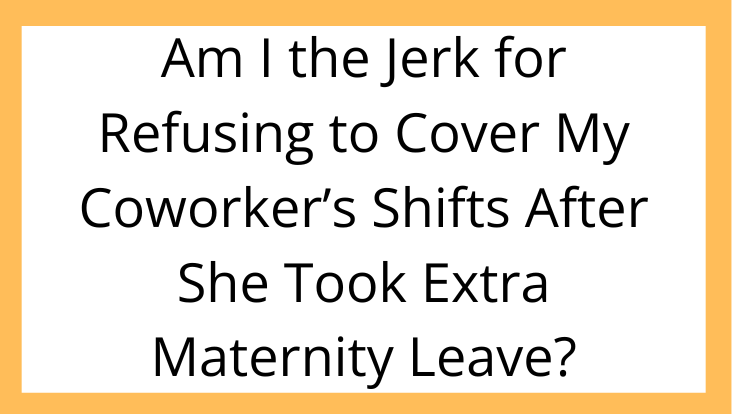Am I the Jerk for Refusing to Cover My Coworker’s Shifts After She Took Extra Maternity Leave?
In today’s workplace, balance between empathy and boundaries is a tightrope walk—especially when personal struggles meet professional obligations. One Reddit user took to the r/AITAH community to ask if they were in the wrong for refusing to cover their coworker’s extended maternity leave. The post sparked intense debate over responsibility, fairness, and the limits of compassion in the office.
Let’s unpack this workplace drama and ask the hard question: When does being helpful turn into being taken advantage of?
The Story: When Support at Work Becomes a Burden

OP (Original Poster) works at a medium-sized company with a tight-knit team. A coworker recently gave birth and took the standard 12 weeks of maternity leave. However, due to complications and postpartum depression, she requested—and was granted—an additional month off.
HR approved it. But here’s the twist: management asked the OP to take on all of her responsibilities during the extension, even though OP already has a full workload.
OP initially helped out during the first 12 weeks without complaint. But when the additional 4 weeks were added—with no pay increase or timeline for relief—they declined to continue covering.
They were told they were being “cold,” “unempathetic,” and “not a team player.”
Now OP is asking: Am I the jerk for saying no to extra work when I’m not being compensated—and it’s affecting my mental health too?
Why This Touched a Nerve: Maternity Leave, Guilt, and Workplace Culture

This AITAH scenario ignited widespread discussion because it highlights a growing issue in modern workplaces: Who carries the burden when life events pull someone away from work?
Maternity Leave Is Important—But So Are Fair Workloads
Nobody doubts that maternity leave is necessary. It’s a right, not a privilege. But when one person steps out, the company—not coworkers—should have a plan in place to manage workflow fairly.
OP didn’t deny their coworker the right to leave. They simply refused to carry both jobs without compensation or support.
The “Team Player” Manipulation

When companies push staff to go above and beyond without support, they often frame it as “being a team player.” But as many Redditors pointed out, there’s a difference between collaboration and exploitation.
A team player is someone who helps within reasonable limits. A pushover is someone who lets others push past every boundary.
Workplace Burnout: The Hidden Cost of “Helping”

OP mentioned that they were already staying late, skipping breaks, and managing stress-induced migraines. Yet they were made to feel selfish for wanting to pull back.
That’s not teamwork. That’s a recipe for burnout.
No one wins when one employee is overworked to support another. Compassion in the workplace should never come at the cost of someone else’s mental health.
Let’s Break It Down: Was OP the Jerk?

Reasonable Help vs. Unlimited Responsibility
OP helped for three months without complaint. But the company never asked what they could handle long-term—it just assumed their help would continue indefinitely. That’s not fairness, that’s pressure.
Lack of Compensation
If you’re taking on a second job’s worth of work, it’s not unreasonable to ask for additional compensation or a workload adjustment. Otherwise, you’re subsidizing the company’s lack of planning with your well-being.
Emotional Guilt Tripping
Being labeled “cold” or “unempathetic” for setting limits is emotional manipulation. Empathy shouldn’t mean sacrificing your own mental or physical health.
What Reddit Said: Not the Jerk

The r/AITAH community overwhelmingly sided with OP. Comments highlighted that:
-
Employers should plan coverage for long-term absences.
-
Maternity leave is a company issue, not a coworker’s burden.
-
Setting boundaries is healthy, not heartless.
One popular comment read:
“It’s okay to say no to unpaid labor. That doesn’t make you a bad coworker—it makes you someone who knows their limits.”
What This Story Teaches Us About Boundaries at Work

1. It’s Okay to Say No
You can support your coworkers and still say no when things go too far. Setting boundaries isn’t selfish—it’s sustainable.
2. HR Should Be the Solution, Not the Problem
If extended leaves are common, there should be backup plans in place—like temps, redistribution of tasks across multiple people, or adjusted deadlines.
3. Don’t Fall for the “Team Player” Trap
Helping once doesn’t obligate you forever. If a company won’t offer you extra resources, they shouldn’t expect you to magically carry the load without strain.
Conclusion: Boundaries Are Not Betrayal

Supporting your team doesn’t mean burning yourself out. Being a kind coworker doesn’t mean being a silent martyr.
This AITAH case is a reminder that empathy and limits can coexist. It’s possible to care for others while still protecting your own well-being.



